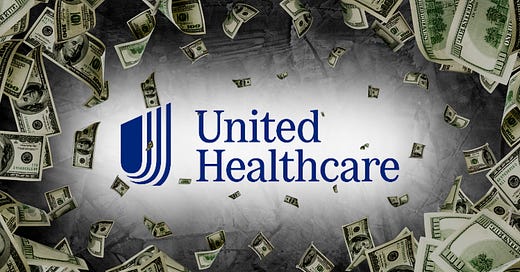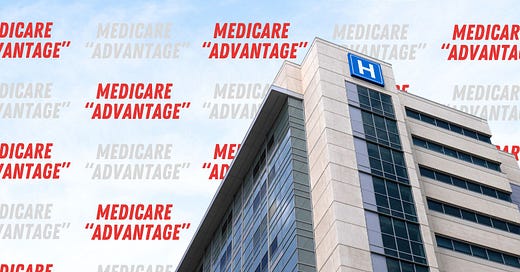

Discover more from HEALTH CARE un-covered
Q1 2023: UnitedHealth Group made $27.8 billion from the drug supply chain; spent $3.5 billion buying back their own stock
You have to wade through numerous bullet points in UnitedHealth Group’s first quarter 2023 earnings release to find one particular number that investors and Wall Street financial analysts always look for–how much the company spent buying back shares of its own stock.
It’s safe to say investors and analysts were pleased when they came across this sentence at the bottom of the second page:
“The company returned $3.5 billion to shareholders in the first quarter through dividends and share repurchases.”
Unless you’ve been keeping track of share buybacks as I have, you likely aren’t aware that health insurers–UnitedHealth in particular–have been using enormous amounts of the money we pay in premiums to buy back shares of their own stock. They do that for one reason: to boost earnings per share, a gimmick that makes shareholders wealthier. And one way they are able to reward their shareholders so generously is by making their health plan enrollees pay more out of their own pockets year after year before their coverage kicks in.
To put that $3.5 billion in perspective, know that the company spent more of our premiums – and tax dollars – buying back its own shares during the first three months of this year than it spent during the first half of 2018 ($3.2 billion). That total is also double what it spent buying back shares during all of 2017.
UnitedHealth has been on a share buyback spending spree for years, but it has really ramped up its share repurchases since the beginning of the pandemic. The company has spent more than $45 billion buying back its own shares since 2007. More than a third of that has been since March 2020.
I’ll write more soon about the vast amounts of money UnitedHealth and the other six for-profit insurers have been spending in this manner to make their shareholders–and their own top executives – much richer while the rest of us are finding it increasingly difficult to even use our health insurance because of sky-high deductibles and other out-of-pocket requirements. The totals are shocking–especially during the pandemic years.
But back to UnitedHealth’s first quarter 2023 financials. While the company and most financial reporters note how various numbers have changed over the same period a year earlier, I look at how they compare with the same quarter 10 years earlier. That provides a better understanding of how the company has grown – and where the growth has come from – over a longer but still relatively short period of time.
Here are some highlights:
UnitedHealth’s revenue and profit growth between the first quarter of 2022 and the first quarter of this year was impressive – total revenues were up 15% (from $80.1 billion to $91.9 billion) and profits were up 16% (from $7 billion to $8.1 billion) – but when you look at the growth over 10 years, you'll see why UnitedHealth has become a Wall Street favorite.
Compared to the first quarter of 2013, the company’s revenues have increased 303% while profits have increased 386%.
Most of that growth has come at the expense of taxpayers as revenues from UnitedHealth's Medicare business – primarily Medicare Advantage – have increased 295% over the past 10 years. The growth in revenues from the Medicaid programs it manages for several states was even more impressive, increasing 423% during the same time period. That compares to a far more modest increase of 49.3% in the company's commercial (employer and individual) revenues over the past 10 years.
As spectacular as the company's growth has been in taxpayer-supported government programs, revenues from UnitedHealth's pharmacy benefit manager (PBM) – Optum Rx – have skyrocketed 528% since the first quarter of 2013.
What that means is that UnitedHealth is capturing enormous amounts of money as one of the three largest middlemen in the pharmaceutical supply chain. In other words, patients who need medications are paying far more to UnitedHealth now than 10 years ago. Its Optum Rx's revenues have grown from $5.2 billion in the first quarter of 2013 to $27.8 billion in the first quarter of this year.
Our 10-year analysis shows clearly that government programs and prescription drugs are fueling UnitedHealth's spectacular growth, which is something that undoubtedly will get scrutiny in Congress over the coming months. Democrats as well as Republicans are introducing bills and scheduling hearings on both sides of Capitol Hill to reform the two big cash cows for the big for-profit health insurance companies: the Medicare Advantage program and the PBM marketplace. UnitedHealth's Optum Rx, along with Cigna's Express Scripts and Aetna/CVS's Caremark, now control 80% of the PBM market.
In terms of health plan enrollment, the company's commercial health plans (employer-sponsored and individual health insurance) have grown by only 50,000 over the past 10 years (an increase of only .18% since 1Q 2013). But enrollment in its Medicare Advantage plans has increased 263% while enrollment in the Medicaid programs it manages has increased 215%. (The company noted in its first quarter earnings report that its Medicaid enrollment stands to increase even more now that it has won Medicaid contract awards in Indiana and Texas.)
Bottom line: UnitedHealth’s shareholders have been big winners over the past several years, especially since the Affordable Care Act was passed. While that law enabled more Americans to afford health insurance premiums through sliding-scale subsidies based on income, it also enabled insurers to ratchet up their out-of-pocket demands year after year. The out-of-pocket maximum established by the ACA has increased 43% since 2014 (when the limit went into effect) to $9,100 for an individual to $18,200 for a family. This means insurers have to pay fewer claims every year. It could be argued that the biggest winners from the passage of the ACA have been health insurers. Since March 23, 2010, the day President Obama signed the ACA into law, UnitedHealth’s stock price has increased by 1800%. By contrast, the Dow Jones Industrial Average has increased 312%.
Subscribe to HEALTH CARE un-covered
Pulling back the curtains on how Big Health is hurting Americans and how we got to this point.
















Good article on United Health but you miss one important fact about stock buybacks. They enrich executives who are issued stock options whose share dilution is offset by the buybacks which make the options ever more valuable. In their 2018 PROXY STATEMENT, UH said that the CEO's compensation was primarily options of close to $15 million and that his income for that year was around $100 million from exercising options, much of it taxed at capital gains rates and free from payroll taxes. Other executives were treated similarly.
The higher and higher deductibles are an interesting point in this article but don’t implicate UHC as much as our (not) representative government and the narrative surrounding healthcare for all. It’s the captured politicians who opportunistically wrote Obamacare legislation with advise and consent of medical insurance companies and pharma. The redistribution of wealth from paying subscribers, who get less care for their premiums, to those corporations is a prime example of corporate-government collusion that doesn’t benefit people and must be changed by people letting their voices be heard and holding pols accountable.